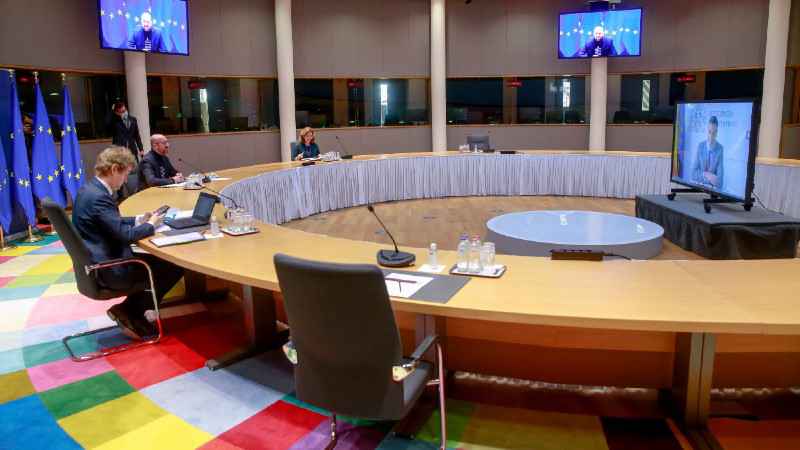EU moves toward stricter export controls for COVID vaccines

European Council President Charles Michel, second left, talks to Spanish Prime Minister Pedro Sanchez, right on a screen, during a video conference ahead of a EU summit at the European Council headquarters in Brussels, Wednesday, March 24, 2021.[Stephanie Lecocq, Photo Pool via AP]
The European Union is moving toward stricter export controls to ensure that there are more COVID-19 shot supplies for the bloc which should boost its flagging vaccine drive at a time of another surge of the coronavirus pandemic on the continent.
The EU’s executive body said Wednesday on the eve of a summit of the 27 leaders that it has a plan ready to guarantee that more vaccines produced in the bloc are available for its own citizens before they can be shipped for exports.
EU nations have been specifically stung by the United Kingdom, which has received some 10 million doses from EU plants while they say nothing came back from Britain. The EU now insists on reciprocity as it sees vaccination rates in Britain racing upwards, while the bloc proceeds at a crawl.
“We have secured more than enough doses for the entire population. But we have to ensure timely and sufficient vaccine deliveries to EU citizens,” European Commission President Ursula von der Leyen said. "Every day counts.”
The EU has been specifically irked by Anglo-Swedish company AstraZeneca. Last week, the European Union’s chief executive warned that the EU would not hesitate to take action against third-party nations.
European Commission President Ursula von der Leyen said the EU has approved the export of some 41 million vaccine doses to 33 countries in the last six weeks and believes that it stands at the forefront of international vaccine-sharing efforts.
Under a less stringent export control system in force so far, only one shipment in 381 has been barred.
The U.K. has been a specific target and British Prime Minister Boris Johnson has sought to ease tensions, speaking by phone in the past few days to European leaders including von der Leyen and French President Emmanuel Macron.
“We’re all fighting the same pandemic across the whole of the European continent,” Johnson told a news conference on Tuesday evening. “Vaccines are an international operation,” he said, adding that the U.K. would “continue to work with European partners to deliver the vaccine rollout.
“We in this country don’t believe in blockades of any kind of vaccines or vaccine materials,” he said.
Still, the EU has been insisting that two AstraZeneca plants in Britain should also be part of the EU deliveries.